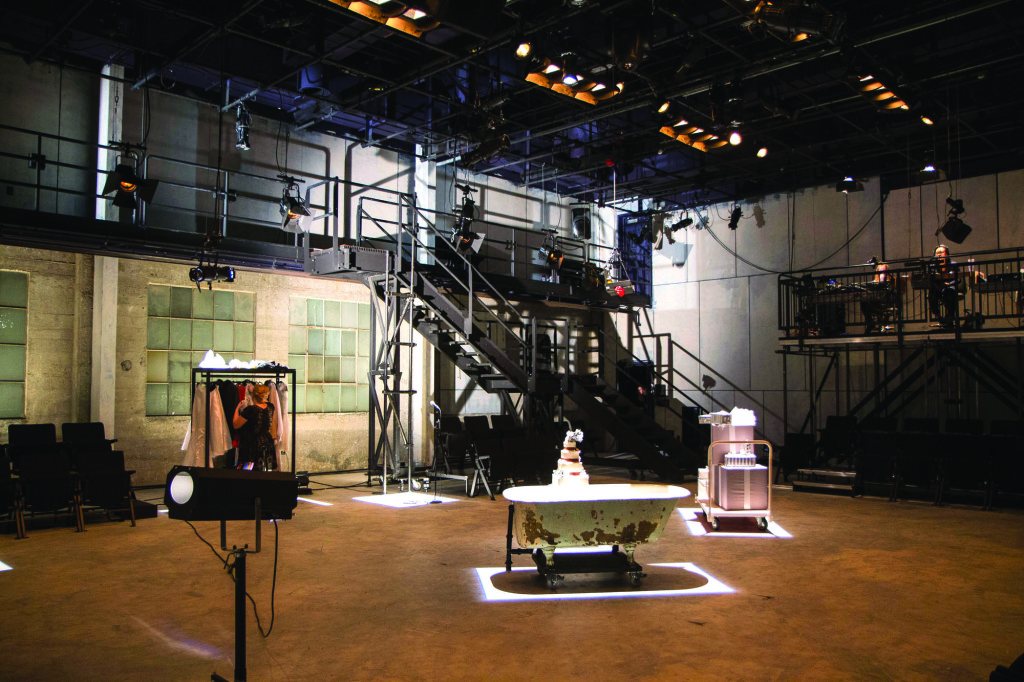As I left Lee Center after seeing the Theatre Department’s spring production of “Big Love,” I heard someone describe the show as “amazing and weird.”
I think that’s a perfect description.
Despite feeling unsettled by the dramatic and macabre closing scenes, I was overwhelmingly impressed by the intricate messages of love, life and empathy. Combined with complex dialogue and strong visual elements, “Big Love’s” impact was immediate and long lasting.

The set for “Big Love,” directed by Rosa Joshi, places the audience around the action. Audience members can choose where they wish to sit, which then determines their viewing angle, and may give rise to their perspectives of the overall story.
The tale begins with Lydia (Ariana Chriest), who we meet as she wanders into the bathtub of a stranger’s house. We quickly learn that she and her 49 sisters fled to Italy for asylum from a forced marriage to their 50 male cousins by their father. As the story unfolds, we meet three of the husbands, misogynistic Constantine (Ishan Tiwathia), confused Oed (Dylan Zucati) and dreamy Nikos (Jacob Swanson), along with two more of Lydia’s sisters, the love-lorn Olympia (Meme Garcia) and the bitter Thyona (Emma Bjornson).
The audience follows the couples as they work through issues of force, loyalty and gender bias.
Though the plot seems to be initially riddled with feminist frustrations, the purpose of the show is much more than a critique of a misogynistic culture: it is a show about being human, and the struggles we face in our own stereotypes. The characters are all seeking safety and security in their own right.
In a dramatic scene, we see the three brides in the middle of the stage wilt to the ground and stand quickly only to sink again as they yell and scream about men and societal expectations of women. The three grooms have a similar scene where they appear to be knocked backward, then stand quickly, only to fall again. The parallels of the two scenes reflect the constant badgering of societally influenced demands on both genders.
The play effectively highlights to the audience the complex relationship created by such demands. The climax of the show (don’t worry, I won’t really spoil it) has you wondering if you are looking at acts of passion or violence—or both, which is the likely answer. With women struggling to overcome the expectation of submission, and men fighting the stereotype of dominance, the climax reveals to us many possible representations of “Big Love.”
The show’s strength lies not only in the relatable themes and messages, but also in the presentation. Adapted from an ancient Greek play, “The Suppliants” by Aeschylus, the work was initially written as long-form poetry. The play’s director, Rosa Joshi, kept that important script and combined modern elements of performance such as singing and slam poetry.
The result was a unique look into the lives of the characters, as though the moments behind the microphone were snippets of their complicated dilemmas and personal musings. The fact that the play originated from an ancient tale also emphasizes how relatable the story is for diverse audiences. It is easy to say the show was a story of sexism, but at its most basic level, “Big Love” is just a story of good and evil—and a person’s place in all of that.
The playwright of this adaptation, Charles Mee, wrote on his website that his play is not meant to be political. Rather, he writes “out of the belief that we are creatures of our history and culture and gender and politics—that our beings and actions arise from that complex of influences and forces and motivations, that our lives are more rich and complex than can be reduced to a single source of human motivation.”
And so, too, do I have a hard time really reducing the impact of this play to a single review. Like Mee tells his audiences, his scripts don’t have a pristine storyline or concrete ending; rather, he plays with twists, turns and the unexpected.
In the end of the play, the audience is told that the greatest human trait is sympathy.
The sentence is powerful. I realized then that, through the tears, shouts, laughter and blood (lots of blood), the misunderstanding within the play isn’t caused by reality, necessarily, but rather by ignorance.
The play feels dream-like, but the message is very real: before there is understanding, there must be empathy. That, perhaps, is the real root of “Big Love.”
“Big Love” will show in Lee Center until May 18. Tickets are $6 for students, $8 for faculty and staff, and $10 for the general public.








